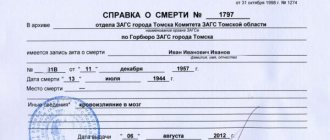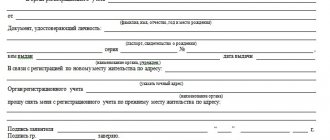Is it possible to check out of an apartment to nowhere?
If there is a need to check out of your home, it is not at all necessary to register again immediately. Domestic legislation provides for several cases when the extract is not accompanied by the provision of information about the new place of registration:
- Sale of an apartment (house) with investment in housing construction, which is at the initial stage. Since the ownership of the new property cannot yet be formalized at this stage, therefore, there is no opportunity to register.
- Sale or donation of housing by the owner, for whom the persons registered in it are not blood relatives.
- Transfer of real estate by inheritance.
- Traveling abroad for permanent residence.
- Alienation of housing that is pledged in the event of non-payment of debt.
How to discharge a person without his presence
- divorce and division of an apartment, while the defendant should not be the owner of the premises;
- long-term evasion of utility bills;
- intentional damage to the apartment and property;
- threats to the life and health of family members, committing a crime against them;
- transfer of the apartment to another owner, while the defendant is not a member of his family;
- use of the premises for purposes other than their intended purpose – for living, but, for example, for trade;
- long absence of the tenant.
In practice, automatic deregistration may take 2-3 months, especially if the distances between cities are considerable. At the same time, the tenant remains obligated to pay utility bills at both addresses, which leads to increased expenses . Of course, you can recalculate later, but it takes time. So it’s better to first deregister at your old address and then register in a new place, not trusting the work of officials during automatic deregistration.
26 Apr 2020 glavurist 141
Share this post
- Related Posts
- What documents are needed when selling a house with land?
- Where to Get Information About the Owner of the Apartment
- Check your personal account debt for the apartment
- How to Get in Line to Improve Housing Conditions in the Moscow Region
How to check out of an apartment going nowhere?
If termination of registration occurs voluntarily, as a rule, problems with registration do not arise. Confirmation in any form of the presence of a new place of registration is not required, so it is quite possible to deregister to nowhere.
Advice: extracting does not always require personal presence. You can deregister from the State Services portal or entrust the application to the competent authorities to another person. You just need to first coordinate this with the authorized bodies and issue a notarized power of attorney.
There are some features of an extract without registration, depending on the type of premises, or more precisely, the form of ownership of it.
Privatized housing
To check out of a premises owned by a private person, you must contact a special authorized body (passport office) and fill out an application form 6. The form is provided by the employees of the institution; you just need to correctly enter the information into it: full name of the person being checked out and the owner of the living space, education, marital status, old and new place of registration. At the same time, practice shows that any address can be indicated as a future address, since the accuracy of this information will not be checked. A more complex procedure for the discharge of children and persons serving a sentence of imprisonment if they are home owners.
See also: How to emigrate from Russia - the best options, profitable programs and the best countries to move to in 2019
Municipal apartment
Voluntarily leaving housing that is state or municipal property is no more difficult than leaving private property, and in some cases it is even easier. For example, if it is necessary to deregister a child, permission from the guardianship authorities will not be required.
Important: persons living under a social tenancy agreement in premises owned by the municipality can be forced out of it only by a court decision if they do not actually live at the appropriate address and do not make payments for utilities, disturb public peace or use the living space not on purpose. To remove such violators from registration, an application is submitted to the municipality followed by filing a lawsuit in court.
Is it possible to sign a person out of an apartment without his presence?
This is one of the most common cases when the owner of an apartment can discharge another person without his personal presence. This procedure will require two statements personally written by the citizen being discharged. The first application must contain a request to be discharged from one place of residence, the second - to be registered in another place.
If a former family member does not want to be deregistered voluntarily, it is necessary to apply to the court for his forced deregistration. In this case, the legislation does not stipulate specific deadlines and, as a rule, the person being discharged has time to find a new place of residence and register at a new address.
Required package of documents
When contacting the authorized bodies in order to be discharged, you must present your passport and attach the following documents to the application:
- Paper on the right to the premises (certificate of ownership).
- A certificate about who is registered in the living space (extract from the house register).
- Departure sheet.
If you are registering a minor, you must submit the following:
- Statement from parents or other legal representatives.
- Permission from the board of trustees (not required in all cases).
- Birth certificate of a minor.
- Parents' passports.
Important: when contacting the passport office to check out, you must present your passport. No other identification document will be accepted in this case.
Features and nuances of the procedure
Without the consent of the person himself (his representative)
In most cases, deregistration without the consent and presence of the citizen can only be done through the court.
Exceptions include:
- those sentenced to imprisonment;
- parents deprived of their rights;
- untimely absence and declared dead.
The process is divided into the following stages:
- collection of necessary evidence.
- Filing a claim in court.
- Consideration of the case in court.
- If the decision is positive, you will receive a deregistration order.
Important ! The claim is filed in the civil court at the location of the residence.
The application must indicate:
- full name of the court.
- Full name of the plaintiff, his passport details and residential address.
- The same information about the defendant.
- Request for recognition of the right of residence as lost or invalid. This paragraph should include a detailed explanation of the situation and the rationale for the request. In other words, it is necessary to describe the reasons why the registrant should be discharged.
- List of documents attached to the application.
The claim is drawn up in three copies: for each of the parties and the court. You will need to attach the following documents to it:
- plaintiff's passport;
- the document on the basis of which the ownership of real estate arose (purchase agreement, will, etc.);
- a document confirming ownership of it (for example, a certificate of ownership or an extract from the Unified State Register of Real Estate);
- receipt of payment of state duty.
The fee is 200 rubles. The receipt is attached in the original, and the remaining documents are in the form of copies.
Let's watch a video about how you can evict a person without his consent:
Depending on the reasons for eviction, you may additionally need originals or copies of other documents:
- divorce certificates;
- court ruling on deprivation of parental rights;
- extract from the house register;
- protocols, decisions on any violations from law enforcement agencies;
- etc.
Witness testimony may also be required. For example, from neighbors that a person does not live in this apartment.
The process of removing a person from a person’s apartment without his or her consent can be complicated by various circumstances. Our experts discuss the most difficult situations that you may encounter in the following publications:
- What to do if you bought an apartment with a registered person and how to register him?
- Is it necessary for the owner of an apartment to register when selling it?
- Is it possible and how can a non-owner be evicted from an apartment?
- How to discharge a deceased person from an apartment?
- How to expel your ex-husband from an apartment if he is not the owner?
- How to expel your ex-wife from the apartment without her consent and what to do if you have a child?
- Is it possible to discharge a disabled person from an apartment without his consent?
- How can you discharge a person who is in prison?
- How can you discharge a person registered in a privatized apartment?
- How to discharge a person without his presence or personal consent and is such an eviction legal?
Is it possible to discharge a minor to nowhere?
Discharge of a person under 18 years of age without subsequent registration is practically impossible. As a general rule, when discharging a child from a privatized apartment, it is necessary to obtain permission from the guardianship authorities, who will give it only if they confirm that the minor will be provided with proper living conditions. The board of trustees can be convinced of this by documents for purchased completed housing or a permit for permanent residence abroad if there is living space in the relevant country. You can challenge the decision of the guardianship authorities in court, but the verdict is unlikely to be positive. The court is primarily guided by the interests of the child. It will be possible to remove him from registration only if the minor’s living conditions do not worsen and the deregistration is carried out jointly with his parents or other legal representatives. If there is no child’s share in a privatized apartment, you don’t have to take the appropriate permission from the guardianship authorities.
See also: What is a temporary residence permit for citizens of Ukraine and how to make one?
Deregistration of a child is permitted in the event of the sale of an apartment (house), if he does not live in the housing in which he is registered, in the event of deprivation of parental rights, as well as when registering in the apartment a person with whom the minor is not related by blood, provided that that the child lives with his parents.
Theoretically, it is possible to create a situation where a child is discharged into nowhere, for example, when selling a home without buying a new one, but in this case, the account opened in the name of the minor should contain an amount equivalent to his part of the apartment (house).
How to expel a registered person from a house if I am the owner - answers from a specialist
- the house was purchased, received as a gift, or inherited before marriage by one of the spouses;
- the person registered in the house does not live and does not pay utilities (provided that he has somewhere to check out);
- citizens who have been deprived of parental rights are discharged from real estate that belongs according to documents to their children, without being provided with other living space;
- a person registered in real estate threatens the health of the owner of the property.
Interesting: What documents are needed to receive interest on mortgage interest?
It is also allowed to discharge a person from home on the basis of being declared missing. This status is assigned to a citizen if a year has passed since the date of recording his disappearance (i.e., from the moment the application was submitted to the police department). The owner of the property can receive a court decision and, on the basis of this document, discharge the person from the living space.
Fines and consequences of lack of registration
In accordance with domestic legislation, everyone who lives in Russia must be registered at their place of residence. This applies equally to citizens of the Russian Federation and foreigners. A person who does not have registration may face various restrictions and even be punished. A list of some opportunities that are unavailable or significantly limited when discharged to anywhere:
- Free medical care, insurance policy.
- Assignment of pensions, various types of benefits and social benefits.
- Obtaining an insurance policy, passport and pension certificate.
- Admission of a child to an educational institution.
- Service in banks and government institutions, obtaining loans.
- Official employment.
For some offenses in the field of registration, administrative, and in some cases even criminal, liability is provided. A person who has not completed registration within 3 months after moving to a new place of residence is subject to a fine, the amount of which depends on the locality, as well as on the category of the offender, and can range from two thousand rubles. In Moscow and St. Petersburg it is several times higher than in other cities. Not only those who live in an apartment without registration can be fined, but also its owner, including a legal entity, and the amount of the fine will be much higher. In this way, the legislator is trying to solve the problem with homeowners refusing to register persons living in their living space.
Foreign citizens must register within 7 days after crossing the border, otherwise they will face administrative liability in the form of a fine. If the period of delay is more than 120 days or the deadlines are violated repeatedly, the foreigner may be forcibly expelled from the country with a ban on entry for the next few years.
See also: Procedure for registering foreigners for migration registration
If it is not possible to obtain permanent registration immediately after discharge, you can make a temporary one, which is valid for six months with subsequent extension. However, it should be remembered that in case of delay, the same liability arises as in the absence of registration.
In some cases, there is no liability for living without registration. We are talking, in particular, about close relatives of the owner of the home. They are allowed to live together with the person who owns the apartment (house), without registration.







